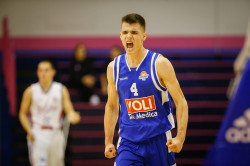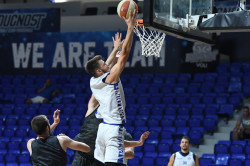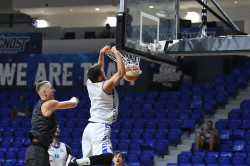By Biel Colominas
Since his stunning performance in the 2018 FIBA U16 European Championship, Fedor Zugic (Kotor, Montenegro, 2003) has been developing at a high pace; from dominating in the youth level of competition, to being the youngest player ever to debut in the Euroleague. Zugic is about to start the season with Buducnost first team, and he has huge expectations to impact in his first professional season.
How do you feel playing and practicing with the team in the preseason after a long time because of the pandemic?
It has been 3 months now, and this is my first professional season so that adds a bit more value to it, being without playing any games has been hard though. But right now, after we played a few games it’s already easier, and I’m getting used to playing against grown men who are much older than me. I trained all this time, I was preparing for it to be ready, so I’m satisfied for now.
Most of the players used this time without competition to try to improve their weaknesses and solidify their strengths. What did you focus to work the most on?
What I focused the most was definitely my body. I spent a lot of time in the gym adding weight, getting bigger, stronger, taking care of my body… To be prepared for the season. And the things that I worked the most on the court were my shot, ball-handling and P&R game.
You have been practicing since an early age with the senior team. How has this experience helped you in your development so far and how do you think it can help you in the future?
It definitely helped me a lot. When I started to practice with them I was like 14-years-old, and playing against older men who were more experienced and stronger than me helped me to develop my game a lot. You have to use your head more and play to your strengths since you aren’t playing with kids anymore, and the older guys don’t go easy on you, you have to develop your game and be tougher. In the long term, that’s what every player should do because it really pays off.
How can you help Buducnost, in a very competitive environment, and be part of the rotation?
I can bring good stuff especially on the offensive end with my shot and my transition game, which is one of my best tools if not the best. Also, I can help on defense thanks to my intensity.
In 2018, an astonishing performance in the FIBA U16 European Championship where you finished second in scoring being one year younger than most of your competitors, put you in the map. How were you able to handle all this hype around you?
It was great, but the hype and everything just motivated me even more. I wasn’t thinking about it back then, because we didn’t perform well and we didn’t reach our goals in that Championship, so I didn’t care a lot about my individual stats. Actually, I didn’t know that I was the second best scorer until my father told me after the last game of the tournament. Playing there was a great experience, I learned a lot from that tournament, there were such tough opponents and I could see where I was compared to my friends from other countries. So the hype was great, but as I said, it just motivated me to be here now, to work even harder and to be more patient waiting for my chance in the professional team.
Also, after that, you became the youngest player ever to play in the Euroleague. What does it mean for you and how do you think your family and your team helped you to keep your feet on the ground after that big achievement?
That was probably one of the best moments in my life, I can still feel that feeling now, it was amazing. Everybody in my family and my club was excited about it, but I want to give thanks to my coach Jasmin Repesa who brought me there, who gave me the chance and put me in. When I was young, my family taught me to stay focused, to keep my head down and work hard; so I’m not the type of guy who will rise above and go, I’m the kind of guy who just settles down, doesn’t think too much about it and just stays in the gym.
The 2003-generation will finish this season as a 18-year-old, which means that this is usually a pivotal season in their careers. What exactly do you expect from this season regarding your long-term goals?
Definitely, this season is very important for me and my friends of the 2003-generation. About my expectations, I just expect to be a huge part of the first team this season, to have my own space and minutes, to help my team to reach our goals and to be one with them. I want to show everybody that I’m ready to play on a professional level, and not just ready to play, but to be as good as any of them.
Which long-term goals do you have and which path do you plan to follow?
I can’t guarantee you what will happen in the future, but I can tell you what I want and what I plan to do. I want to stay home with my club Buducnost, and become the first Montenegrin who will go from Buducnost, his home, to be drafted in the NBA, that’s my perfect plan. So I’m going to follow my path here until I’m 19; I believe in Buducnost and this is definitely one of my main goals of my career, I want to leave my footprint here so everybody can remember me with good light. I want to bring to this city as much as it gave me, to kind of pay my debt, because they really gave me everything and I’m grateful for that.
Since his stunning performance in the 2018 FIBA U16 European Championship, Fedor Zugic (Kotor, Montenegro, 2003) has been developing at a high pace; from dominating in the youth level of competition, to being the youngest player ever to debut in the Euroleague. Zugic is about to start the season with Buducnost first team, and he has huge expectations to impact in his first professional season.
How do you feel playing and practicing with the team in the preseason after a long time because of the pandemic?
It has been 3 months now, and this is my first professional season so that adds a bit more value to it, being without playing any games has been hard though. But right now, after we played a few games it’s already easier, and I’m getting used to playing against grown men who are much older than me. I trained all this time, I was preparing for it to be ready, so I’m satisfied for now.
Most of the players used this time without competition to try to improve their weaknesses and solidify their strengths. What did you focus to work the most on?
What I focused the most was definitely my body. I spent a lot of time in the gym adding weight, getting bigger, stronger, taking care of my body… To be prepared for the season. And the things that I worked the most on the court were my shot, ball-handling and P&R game.
You have been practicing since an early age with the senior team. How has this experience helped you in your development so far and how do you think it can help you in the future?
It definitely helped me a lot. When I started to practice with them I was like 14-years-old, and playing against older men who were more experienced and stronger than me helped me to develop my game a lot. You have to use your head more and play to your strengths since you aren’t playing with kids anymore, and the older guys don’t go easy on you, you have to develop your game and be tougher. In the long term, that’s what every player should do because it really pays off.
How can you help Buducnost, in a very competitive environment, and be part of the rotation?
I can bring good stuff especially on the offensive end with my shot and my transition game, which is one of my best tools if not the best. Also, I can help on defense thanks to my intensity.
In 2018, an astonishing performance in the FIBA U16 European Championship where you finished second in scoring being one year younger than most of your competitors, put you in the map. How were you able to handle all this hype around you?
It was great, but the hype and everything just motivated me even more. I wasn’t thinking about it back then, because we didn’t perform well and we didn’t reach our goals in that Championship, so I didn’t care a lot about my individual stats. Actually, I didn’t know that I was the second best scorer until my father told me after the last game of the tournament. Playing there was a great experience, I learned a lot from that tournament, there were such tough opponents and I could see where I was compared to my friends from other countries. So the hype was great, but as I said, it just motivated me to be here now, to work even harder and to be more patient waiting for my chance in the professional team.
Also, after that, you became the youngest player ever to play in the Euroleague. What does it mean for you and how do you think your family and your team helped you to keep your feet on the ground after that big achievement?
That was probably one of the best moments in my life, I can still feel that feeling now, it was amazing. Everybody in my family and my club was excited about it, but I want to give thanks to my coach Jasmin Repesa who brought me there, who gave me the chance and put me in. When I was young, my family taught me to stay focused, to keep my head down and work hard; so I’m not the type of guy who will rise above and go, I’m the kind of guy who just settles down, doesn’t think too much about it and just stays in the gym.
The 2003-generation will finish this season as a 18-year-old, which means that this is usually a pivotal season in their careers. What exactly do you expect from this season regarding your long-term goals?
Definitely, this season is very important for me and my friends of the 2003-generation. About my expectations, I just expect to be a huge part of the first team this season, to have my own space and minutes, to help my team to reach our goals and to be one with them. I want to show everybody that I’m ready to play on a professional level, and not just ready to play, but to be as good as any of them.
Which long-term goals do you have and which path do you plan to follow?
I can’t guarantee you what will happen in the future, but I can tell you what I want and what I plan to do. I want to stay home with my club Buducnost, and become the first Montenegrin who will go from Buducnost, his home, to be drafted in the NBA, that’s my perfect plan. So I’m going to follow my path here until I’m 19; I believe in Buducnost and this is definitely one of my main goals of my career, I want to leave my footprint here so everybody can remember me with good light. I want to bring to this city as much as it gave me, to kind of pay my debt, because they really gave me everything and I’m grateful for that.




